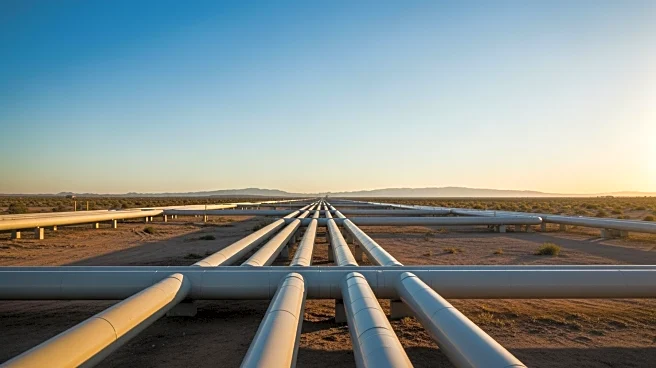What's Happening?
U.S. natural gas pipeline exports to Mexico have reached unprecedented levels, averaging 7.5 billion cubic feet per day (bcfd) in May 2025, according to the U.S. Energy Information Administration (EIA).
This marks the highest monthly export volume on record, driven by increasing demand for natural gas in Mexico, particularly in the electric power sector. The annual average for 2024 was 6.4 bcfd, a 25% increase from 2019, setting a new record in data that dates back to 1975. The majority of these exports, 91%, originate from West and South Texas, facilitated by the development of additional connecting pipelines in central and southwestern Mexico. Despite this growth, the exports are limited by Mexico's pipeline infrastructure constraints and limited gas storage capacity.
Why It's Important?
The surge in natural gas exports to Mexico underscores the growing interdependence between the U.S. and Mexico in energy trade. This trend benefits U.S. natural gas producers by providing a stable and expanding market for their products, potentially offsetting domestic market fluctuations. For Mexico, increased imports are crucial to meeting the rising energy demands of its expanding electric power sector. However, the limitations in Mexico's infrastructure highlight the need for further investment to fully capitalize on this energy partnership. The situation also reflects broader trends in North American energy integration, with implications for energy security and economic cooperation between the two nations.
What's Next?
Future developments may include further infrastructure investments in Mexico to enhance pipeline capacity and storage facilities, enabling even greater imports of U.S. natural gas. This could lead to increased economic benefits for both countries, with U.S. producers gaining a more reliable export market and Mexico securing a stable energy supply. Additionally, policy decisions in both countries regarding energy trade and infrastructure development will play a critical role in shaping the future of this bilateral energy relationship.
Beyond the Headlines
The record levels of natural gas exports to Mexico may also influence regional energy policies and environmental considerations. As natural gas is often seen as a cleaner alternative to coal and oil, this shift could contribute to reduced carbon emissions in Mexico's power sector. However, it also raises questions about the long-term sustainability of fossil fuel reliance and the need for a balanced approach that includes renewable energy sources.









